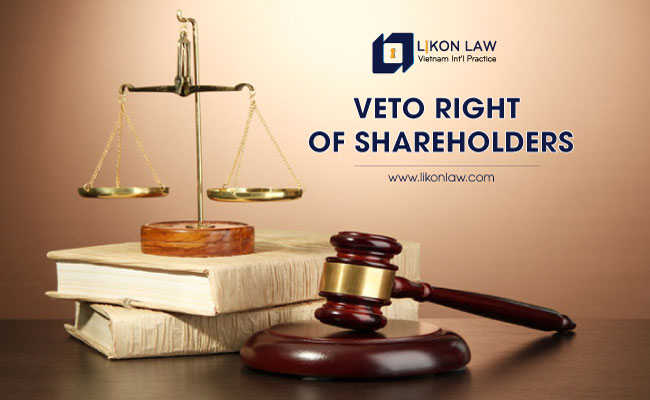Multi-member Limited Liability Companies and Joint Stock Companies are the two most popular forms of enterprises, which is often preferred by domestic and foreign investors when conducting their business investment activities in Vietnam.
Because businesses are typically capital-oriented and follow a collective ownership model (including co-owners), decision making process shall be based on proportion of shares. In this context, to protect the interests of investors who are minority shareholders/members of the company, the law sets forth a certain share/stake ratio so that investors can protect some of their minimum rights.
Veto right of shareholders/members
Veto is understood as the right to reject, refuse to pass a majority resolution.
In Joint Stock Companies, the veto of shareholders is understood as the right of shareholders or groups of shareholders who own a certain percentage of shares in the company to reject a resolution of the GMS, which is approved by the majority of shareholders.
This veto is similarly understood in the form of the Multi-member Limited Liability Companies, then, the member/group of members who own a certain percentage of the capital contributed to the company is entitled to reject a resolution of the Members’ Council, which is approved by the majority of members.
Importance of veto right
Due to the model of collective ownership, each shareholder or member shall hold a certain percentage of shares or capital contributions. In addition, with its “capital-oriented” characteristic, through holding a certain percentage of shares or capital contributions in the company, shareholders or members shall show their ownership, control, or dominance over that company.
Thus, if a shareholder or member holds a higher ratio of the shares/ capital contributions in the company, the greater these powers of such shareholders or members. Thereafter, to limit the power of “Majority Shareholders/Members” to influence and adversely affect the company in general, and the “Minority Shareholders/Members”, in particular, the law specifies certain share/capital contribution ratios so that those who own such ratios can protect their rights.
As a result of this, the veto right of Minority Shareholders/Members was created and is widely applied today.
Percentage of share constitutes a veto right in a Joint-stock Company
Pursuant to Article 148 of the 2020 Law on Enterprise, unless otherwise stated in the company’s charter, the specific rate for the GMS to approve decisions in the Joint-stock Company is:
- from 65% of the total votes of all shareholders attending the meeting approved when voting at the meeting and on the significant issues mentioned in Clause 1 Article 148 of the 2020 Law on Enterprise. Specifically: Deciding on the type of share and the quantity of each share; Changing the company’s business lines; Changing the company’s organization structure; deciding to approve an investment project or sale of assets valued at least 35% of the total value of assets written in the latest financial statements, unless another ratio or value is specified in the company’s charter; Re-organizing or dissolving the company; Other issues are specified in the company’s charter.
- from more than 50% of the total votes of all shareholders attending approve when voting at the meeting and on the common issues mentioned in Clause 2 Article 148 of the 2020 Law on Enterprise.
In comparison with the above provisions, when a shareholder/group of shareholders owns more than 35% of the charter capital (total number of shares with voting rights), they shall have the right to veto significant issues that fall into the competence of the GMS stipulated in Clause 1, Article 148 of the Law on Enterprise 2020.
Percentage of contributed capital constitutes a veto right in Multi-member Limited Liability Companies
Pursuant to Article 59 of Law on Enterprise 2020, unless otherwise stated by the Charter, the specific rate for the BOM to approve decisions and resolutions in Multi-member Limited Liability Companies is:
- the members present own 75% of the total capital contribution of all the members attending the meeting agree with the resolutions and decisions on the significant issues such as: selling assets worth at least 50% of the total value of assets written in the latest financial statements or a smaller ratio or value specified in the company’s charter; amending and supplementing the company’s charter; reorganizing or dissolving the company.
- the members present own 65% of the total capital contribution of all members attending the meeting agree with the resolutions and decisions on other common issues.
In comparison with the above provisions, when a member/group of members owns more than 25% of the charter capital (total capital contribution), they shall have the right to veto the significant issues and contents under the competence of the above-mentioned Members’ Council.
Some recommendations
Shareholders must pay close attention to the minimum share/capital contribution ratio in the company to ensure their rights as well as control of important issues in the company.
In addition, in fact, some minority shareholders/ members choose another method to expand their rights in several issues under shareholders’ or members’ agreements. However, the legality of the shareholders’ is not clear-cut, which may not be in accordance with the provisions of the company’s charter or even contrary to the provisions of the law, so shareholders/members should carefully consider and pay attention to the validity of these agreements in the event of a dispute.
Therefore, to ensure the optimization of shareholders’ or members’ rights and interests in the company, it is recommended that shareholders or members consult carefully with experts, lawyers when considering the detailed contents of the veto right and exercise this right in practice when the company proceeds to pass specific decisions/resolutions in each case.

